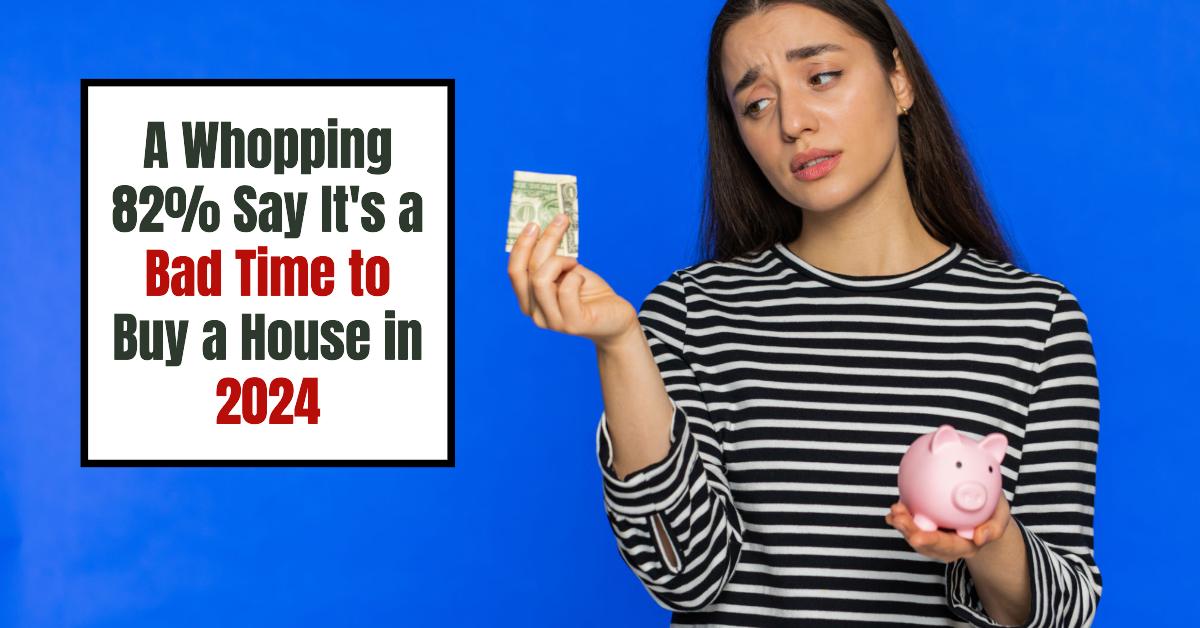In today's fluctuating economy, the sentiment surrounding the housing market is decidedly bleak. 82% of people say it's a ‘bad time' to buy a house, reflecting deep-rooted concerns about affordability, rising mortgage rates, and an uncertain economic climate. Recent data from the Fannie Mae Home Purchase Sentiment Index (HPSI) reveals that a staggering 83% of potential homebuyers feel sidelined by these obstacles, leading to apprehension about making one of the most significant financial decisions of their lives.
Housing Market 2024: A Whopping 82% Say It's a Bad Time to Buy a House
Current State of the Housing Market
The Fannie Mae HPSI experienced a decline of 1.1 points in July 2024, registering at 71.5, a sharp descent from previous months. This drop signifies a consistent erosion of consumer confidence as affordability challenges hamper buyer interest. Here's a closer look at some crucial metrics from the latest survey:
- Good Time to Buy: Only 17% of respondents believe it's an ideal time to buy a home, down from 19% in June.
- Bad Time to Buy: The percentage of those convinced it's a bad time to buy has swelled from 81% to 82%.
- Good Time to Sell: The sentiment surrounding selling has also dipped, with 65% believing it’s a good time to sell, down from 66%.
These statistics underscore a lack of optimism in the market, primarily driven by elevated home prices and mortgage rates. Doug Duncan, Senior Vice President and Chief Economist at Fannie Mae, highlighted this growing frustration, stating that household incomes are increasingly strained relative to expected mortgage or rent payments.
Consumer Concerns and Expectations
A significant concern for many prospective homebuyers is the expectation of rising home prices. Nearly 41% anticipate home prices will increase, while 21% expect them to decrease. This outlook creates a sense of urgency among potential buyers, driving them to act quickly before prices potentially escalate further.
Moreover, when it comes to mortgage rates:
- 29% of respondents think rates will decline in the next 12 months.
- Conversely, 31% believe they will rise.
This mixed set of expectations has left many feeling stuck in a cycle of indecision, as high mortgage rates compounding high home prices create a perfect storm of affordability issues.
Understanding the Shift in Consumer Attitudes
The latest survey reveals broader implications regarding housing trends and consumer sentiment. While many consumers continue to aspire to own a home, an increasing percentage express a willingness to rent rather than buy on their next move. This shift indicates either buyer fatigue or a growing disenchantment with the market.
Moreover, concerns about job security also weigh on consumer decisions:
- 21% of respondents are worried about losing their jobs within the next 12 months, up from 20%.
- A slight decrease in those reporting increasing household incomes—rising from 16% last year to 18%—also suggests that financial stability is lessening.
These factors compound to create an environment where 82% of individuals identify current conditions as unsuitable for purchasing a home.
The Implications of Consumer Sentiment
As housing demand continues to wane, the potential for decreasing home sales could have significant ramifications across various sectors. A prolonged wait for better market conditions may lead to changes that could affect:
- Price Adjustments: Should the trend continue, we may start to see a stabilization or even a decrease in home prices as sellers adjust to the decreasing interest from buyers.
- Mortgage Rate Stabilization: As purchasing power declines and fewer buyers enter the market, lenders may need to reconsider mortgage rates to remain competitive.
- Shift to Renting: An increase in renting could spur growth in that market segment, hindering the traditional homeownership model that many aspire to achieve.
Conclusion
In summary, the sentiment that 82% of people say it's a ‘bad time' to buy a house hangs like a dark cloud over the housing market. The combination of rising prices, high mortgage rates, and concerns about job stability creates an environment of uncertainty for many would-be homebuyers.
While pockets of affordability may slowly emerge in certain regions, broad consumer frustration continues to be prevalent. As the Fannie Mae HPSI suggests, the outlook remains grim for the housing market as long as these fundamental issues persist. Whether this will translate to long-term changes in consumer behavior and market conditions remains to be seen.
ALSO READ:
- Should I Buy A House Now Or Wait Until Later 2024? It a Good Time?
- Is it a Good Time to Buy a House in California in 2024?
- Is It a Good Time to Sell a House or Should I Wait in 2024?
- Is Now a Good Time to Invest in Rental Property (2024)?
- Is 2024 a Good Time to Buy an Investment Property?
- Housing Market Predictions for the Next 2 Years
- Housing Market Predictions for Next 5 Years (2024-2028)
- 2024 Housing Market vs. 2008 Crash: Key Differences
- Economist Predicts Stock Market Crash Worse Than 2008 Crisis
- How Much Did Housing Prices Drop in 2008?




